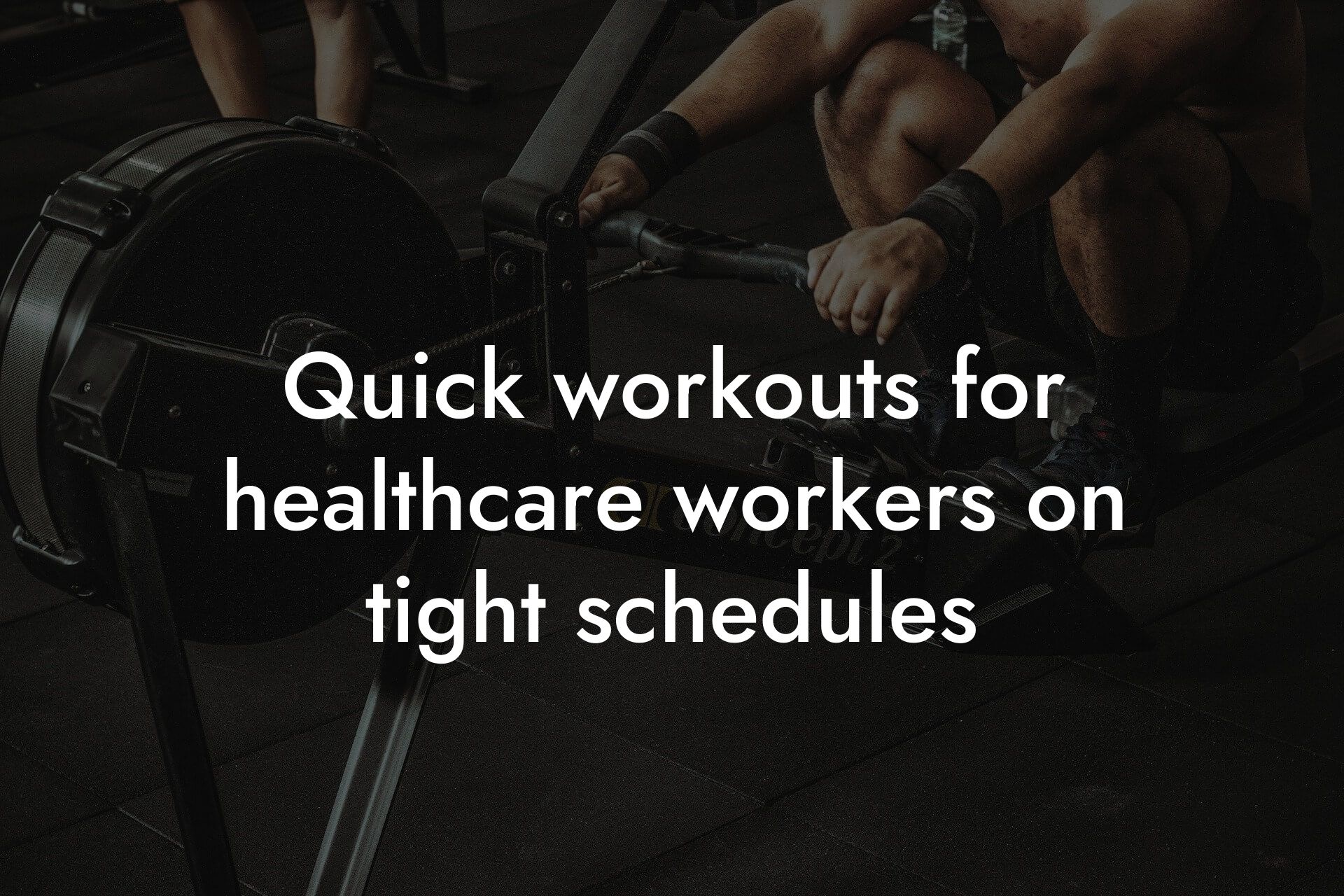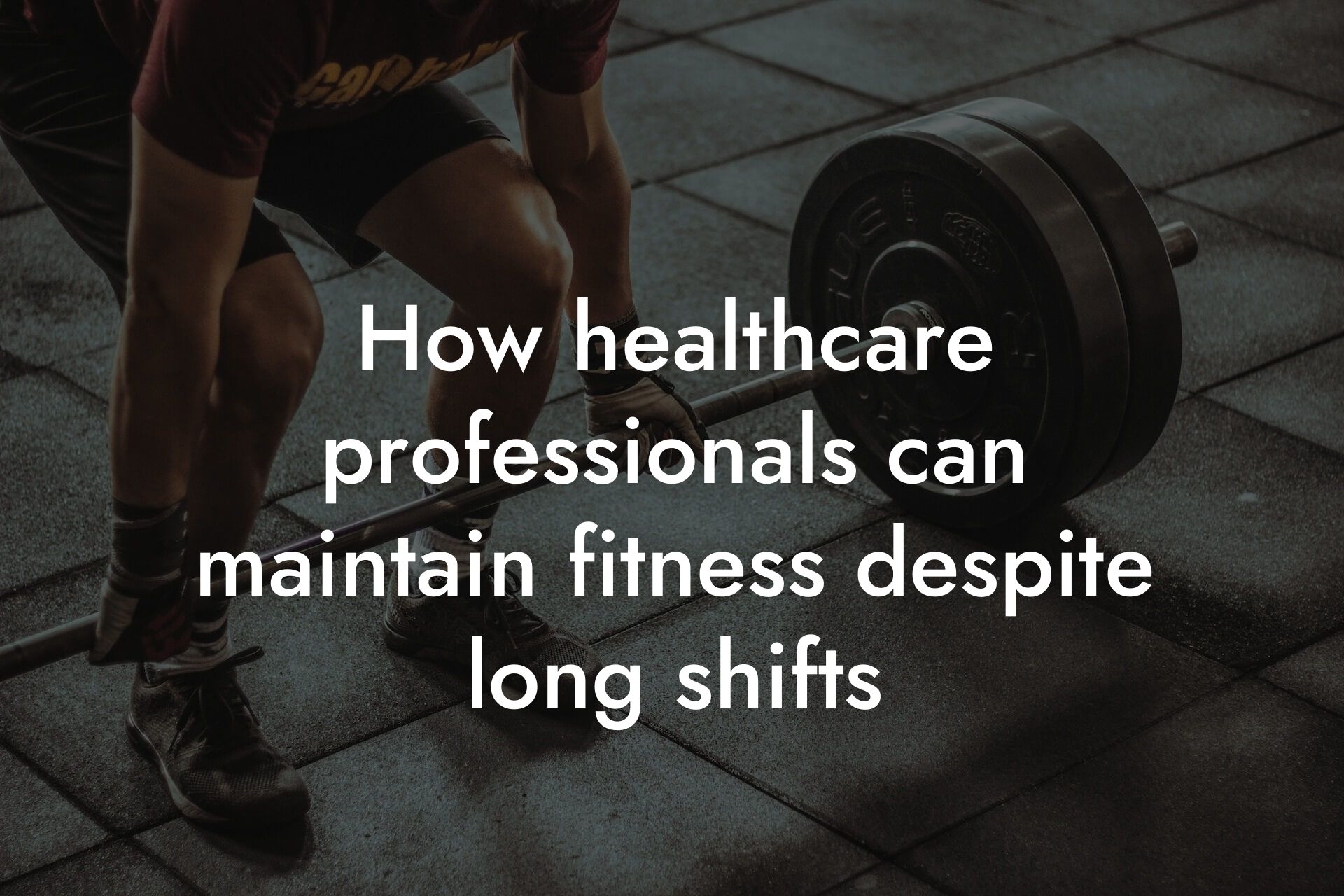As a healthcare professional, you understand the importance of being in top physical and mental shape to perform at your best. Your job demands long hours, high levels of concentration, and the ability to make quick decisions that can impact patient care. However, have you ever stopped to consider how your body composition might be affecting your job performance? In this article, we'll explore the connection between body composition and job performance in healthcare, and how understanding this relationship can help you take your career to the next level.
Table of Contents
- What is Body Composition?
- The Impact of Body Fat on Job Performance
- The Importance of Lean Mass in Healthcare
- The Role of Bone Density in Healthcare
- How Body Composition Affects Mental Performance
- Assessing Body Composition in Healthcare Professionals
- Optimizing Body Composition for Job Performance
- Frequently Asked Questions
What is Body Composition?
Body composition refers to the percentage of fat and lean mass in your body. It's a critical aspect of overall health and fitness, as it can impact your energy levels, metabolism, and overall well-being. In healthcare, having a healthy body composition is essential, as it can affect your ability to perform physically demanding tasks, think clearly, and make sound decisions. A healthy body composition typically consists of a balance between fat mass (body fat) and lean mass (muscle, bone, and water).
The Impact of Body Fat on Job Performance
Excess body fat can have a significant impact on job performance in healthcare. Carrying excess weight can lead to fatigue, decreased mobility, and reduced endurance, making it challenging to keep up with the demands of a healthcare job. Additionally, excess body fat can increase the risk of chronic diseases, such as diabetes and cardiovascular disease, which can further compromise job performance. Furthermore, research has shown that excess body fat can impair cognitive function, including attention, memory, and decision-making abilities, all of which are critical skills for healthcare professionals.
The Importance of Lean Mass in Healthcare
Lean mass, on the other hand, is essential for optimal job performance in healthcare. Having a high percentage of lean mass can improve strength, endurance, and agility, making it easier to perform physically demanding tasks. Lean mass also plays a critical role in maintaining bone density, which is essential for preventing injuries and osteoporosis. Moreover, research has shown that lean mass is positively correlated with cognitive function, including attention, memory, and executive function, all of which are critical skills for healthcare professionals.
The Role of Bone Density in Healthcare
Bone density is another critical aspect of body composition that can impact job performance in healthcare. Having low bone density can increase the risk of osteoporosis, fractures, and injuries, which can compromise job performance and overall health. In healthcare, having strong bones is essential for maintaining mobility, balance, and coordination, all of which are critical for performing physically demanding tasks. Furthermore, research has shown that bone density is positively correlated with cognitive function, including attention, memory, and executive function, all of which are critical skills for healthcare professionals.
How Body Composition Affects Mental Performance
Body composition can also have a significant impact on mental performance in healthcare. Research has shown that excess body fat can impair cognitive function, including attention, memory, and decision-making abilities, all of which are critical skills for healthcare professionals. On the other hand, having a high percentage of lean mass can improve cognitive function, including attention, memory, and executive function. Furthermore, having strong bones can also improve cognitive function, as it can reduce the risk of osteoporosis and fractures, which can impair cognitive function.
Assessing Body Composition in Healthcare Professionals
Assessing body composition is critical for healthcare professionals who want to optimize their job performance. There are several methods for assessing body composition, including dual-energy X-ray absorptiometry (DEXA), bioelectrical impedance analysis (BIA), and skinfold measurements. DEXA is considered the gold standard for assessing body composition, as it provides a detailed breakdown of fat mass, lean mass, and bone density. At Tano Performance Group, we use DEXA machines to provide healthcare professionals with a complete body assessment, including a detailed breakdown of their body composition.
Optimizing Body Composition for Job Performance
Optimizing body composition is essential for healthcare professionals who want to take their job performance to the next level. This can be achieved through a combination of regular exercise, healthy eating, and stress management. Resistance training and high-intensity interval training (HIIT) can help increase lean mass and improve bone density, while a balanced diet that is high in protein and low in processed foods can help reduce body fat. Additionally, stress management techniques, such as meditation and yoga, can help reduce cortisol levels, which can contribute to excess body fat. By optimizing body composition, healthcare professionals can improve their energy levels, cognitive function, and overall job performance.
In conclusion, body composition plays a critical role in job performance in healthcare. Having a healthy body composition can improve energy levels, cognitive function, and overall job performance, while excess body fat and low bone density can compromise job performance and overall health. By understanding the connection between body composition and job performance, healthcare professionals can take steps to optimize their body composition and take their career to the next level. At Tano Performance Group, we are committed to helping healthcare professionals achieve their goals through our comprehensive body assessment and personalized coaching services.
Frequently Asked Questions
What is the connection between body composition and job performance in healthcare?
Research has shown that there is a significant connection between body composition and job performance in healthcare. Healthcare professionals with a healthy body composition, characterized by a low body fat percentage, high muscle mass, and strong bone density, tend to perform better in their jobs. This is because a healthy body composition is associated with improved physical and mental stamina, reduced fatigue, and enhanced cognitive function.
How does body fat percentage affect job performance in healthcare?
A high body fat percentage can negatively impact job performance in healthcare by reducing energy levels, increasing fatigue, and impairing cognitive function. Excess body fat can also lead to chronic diseases such as diabetes and cardiovascular disease, which can further compromise job performance.
What is the ideal body fat percentage for healthcare professionals?
The ideal body fat percentage for healthcare professionals varies depending on age, sex, and other factors. Generally, a body fat percentage of 10-15% for men and 15-20% for women is considered healthy and optimal for job performance.
How does muscle mass affect job performance in healthcare?
Muscle mass plays a critical role in job performance in healthcare. Healthcare professionals with high muscle mass tend to have improved physical stamina, reduced fatigue, and enhanced cognitive function. This enables them to perform their duties more efficiently and effectively.
What is the relationship between bone density and job performance in healthcare?
Bone density is an important indicator of overall health and can affect job performance in healthcare. Healthcare professionals with strong bone density tend to have improved physical function, reduced risk of injury, and enhanced cognitive function, all of which are essential for optimal job performance.
How can healthcare professionals improve their body composition?
Healthcare professionals can improve their body composition through a combination of regular exercise, healthy eating, and stress management. This can include engaging in resistance training to build muscle mass, performing aerobic exercises to improve cardiovascular health, and eating a balanced diet that is rich in nutrients and low in processed foods.
What are the benefits of regular exercise for healthcare professionals?
Regular exercise provides numerous benefits for healthcare professionals, including improved physical and mental stamina, reduced fatigue, enhanced cognitive function, and improved overall health and well-being. Exercise can also reduce the risk of chronic diseases, improve sleep quality, and enhance mood.
How can healthcare professionals manage stress to improve their body composition?
Stress management is critical for healthcare professionals who want to improve their body composition. This can be achieved through techniques such as meditation, deep breathing, and yoga, as well as engaging in relaxing activities such as reading or listening to music. Healthcare professionals can also prioritize self-care, set realistic goals, and seek support from colleagues and friends.
What is the impact of shift work on body composition in healthcare professionals?
Shift work can have a negative impact on body composition in healthcare professionals. Irregular sleep patterns, poor eating habits, and reduced physical activity can all contribute to weight gain, fatigue, and reduced job performance. Healthcare professionals who work shifts can mitigate these effects by prioritizing healthy eating, staying hydrated, and engaging in regular exercise.
How can healthcare professionals prioritize self-care to improve their body composition?
Prioritizing self-care is essential for healthcare professionals who want to improve their body composition. This can include setting realistic goals, seeking support from colleagues and friends, and engaging in activities that bring joy and relaxation. Healthcare professionals can also prioritize sleep, eat a balanced diet, and engage in regular exercise to improve their overall health and well-being.
What is the role of nutrition in body composition for healthcare professionals?
Nutrition plays a critical role in body composition for healthcare professionals. A balanced diet that is rich in nutrients and low in processed foods can help support muscle growth, reduce body fat, and improve overall health and well-being. Healthcare professionals should prioritize whole foods, including fruits, vegetables, whole grains, lean proteins, and healthy fats.
How can healthcare professionals stay hydrated to improve their body composition?
Staying hydrated is essential for healthcare professionals who want to improve their body composition. Adequate hydration can improve physical performance, reduce fatigue, and enhance cognitive function. Healthcare professionals should aim to drink at least eight glasses of water per day and avoid sugary drinks and caffeine.
What is the impact of sleep on body composition in healthcare professionals?
Sleep plays a critical role in body composition for healthcare professionals. Adequate sleep can improve physical performance, reduce fatigue, and enhance cognitive function, while poor sleep can lead to weight gain, fatigue, and reduced job performance. Healthcare professionals should aim to get 7-9 hours of sleep per night and prioritize sleep hygiene practices such as maintaining a consistent sleep schedule and creating a relaxing sleep environment.
How can healthcare professionals improve their bone density?
Healthcare professionals can improve their bone density through a combination of regular exercise, calcium and vitamin D supplementation, and a balanced diet that is rich in nutrients. Exercise such as weight-bearing activities and resistance training can help improve bone density, while calcium and vitamin D can help support bone health.
What is the relationship between body composition and mental health in healthcare professionals?
There is a significant relationship between body composition and mental health in healthcare professionals. Healthcare professionals with a healthy body composition tend to have improved mental health, reduced symptoms of anxiety and depression, and enhanced overall well-being. This is because a healthy body composition is associated with improved self-esteem, reduced stress, and enhanced cognitive function.
How can healthcare professionals prioritize their mental health to improve their body composition?
Prioritizing mental health is essential for healthcare professionals who want to improve their body composition. This can include seeking support from colleagues and friends, engaging in stress-reducing activities such as meditation and yoga, and prioritizing self-care. Healthcare professionals can also seek professional help if they are struggling with mental health issues.
What is the impact of body composition on patient care in healthcare professionals?
Body composition can have a significant impact on patient care in healthcare professionals. Healthcare professionals with a healthy body composition tend to have improved physical and mental stamina, reduced fatigue, and enhanced cognitive function, all of which are essential for providing high-quality patient care.
How can healthcare professionals use body composition to improve patient outcomes?
Healthcare professionals can use body composition to improve patient outcomes by prioritizing their own health and well-being. This can include engaging in regular exercise, eating a balanced diet, and managing stress, all of which can improve physical and mental stamina, reduce fatigue, and enhance cognitive function.
What are the benefits of a healthy body composition for healthcare professionals?
A healthy body composition provides numerous benefits for healthcare professionals, including improved physical and mental stamina, reduced fatigue, enhanced cognitive function, and improved overall health and well-being. A healthy body composition can also reduce the risk of chronic diseases, improve sleep quality, and enhance mood.
How can healthcare professionals maintain a healthy body composition over time?
Maintaining a healthy body composition over time requires a long-term commitment to healthy lifestyle habits. Healthcare professionals can maintain a healthy body composition by prioritizing regular exercise, eating a balanced diet, managing stress, and getting adequate sleep. They can also seek support from colleagues and friends, and prioritize self-care.
What resources are available to healthcare professionals to improve their body composition?
There are numerous resources available to healthcare professionals who want to improve their body composition. These include fitness classes, personal training, nutrition counseling, and stress management programs. Healthcare professionals can also seek support from colleagues and friends, and prioritize self-care.
How can healthcare professionals overcome barriers to improving their body composition?
Healthcare professionals may face numerous barriers to improving their body composition, including lack of time, lack of motivation, and lack of resources. To overcome these barriers, healthcare professionals can prioritize their health and well-being, seek support from colleagues and friends, and find creative solutions to fit healthy habits into their busy schedules.
What is the role of leadership in promoting a culture of health and wellness in healthcare organizations?
Leadership plays a critical role in promoting a culture of health and wellness in healthcare organizations. Leaders can promote a culture of health and wellness by prioritizing employee health and well-being, providing resources and support for healthy habits, and leading by example. This can include providing access to fitness classes, nutrition counseling, and stress management programs, as well as promoting a healthy work environment.
Here are some related articles you might love...
- Quick workouts for healthcare workers on tight schedules
- Nutrition strategies for energy during long surgeries
- How healthcare professionals can maintain fitness despite long shifts
- Managing stress through physical fitness in the healthcare industry
- How to maintain bone density in physically demanding healthcare roles
- The impact of physical health on patient care
- How DEXA scans can benefit healthcare professionals
- How to balance night shifts with fitness goals
- The importance of fitness for preventing healthcare worker burnout
Zak Faulkner
Zak Faulkner is a leading authority in the realm of physical health and body composition analysis, with over 15 years of experience helping professionals optimise their fitness and well-being. As one the experts behind Tano Performance Group, Zak has dedicated his career to providing in-depth, science-backed insights that empower clients to elevate their physical performance and overall health.
With extensive knowledge of DEXA technology, Zak specializes in delivering comprehensive body assessments that offer precise data on body fat, muscle mass, bone density, and overall physique. His expertise enables individuals to make informed decisions and achieve their fitness goals with accuracy and confidence. Zak’s approach is rooted in a deep understanding of human physiology, combined with a passion for helping clients unlock their full potential through personalised strategies.
Over the years, Zak has earned a reputation for his commitment to excellence, precision, and client-focused service. His guidance is trusted by top professionals who demand the best when it comes to their health. Whether advising on fitness programs, nutritional strategies, or long-term wellness plans, Zak Faulkner’s insights are a valuable resource for anyone serious about taking their health and fitness to the next level.
At Tano Performance Group, Zak continues to lead our Content Team revolutionising how professionals approach their physical health, offering unparalleled expertise that drives real results.




